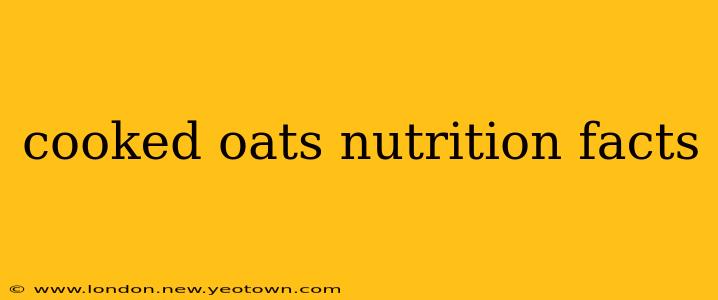Oats, those humble grains, have quietly become a breakfast staple and a health food hero. But what exactly makes cooked oats so nutritious? Let's delve into the delicious details and uncover why this simple bowl of goodness deserves a place in your daily diet. This isn't just another nutrition facts rundown; it's a story of how a simple grain can pack a powerful punch.
Imagine this: a chilly morning, the aroma of warm oats filling your kitchen. That comforting feeling is just the beginning. Each spoonful is brimming with vitamins, minerals, and fiber, setting the stage for a productive and energized day.
What are the nutritional benefits of cooked oats?
Cooked oats are a nutritional powerhouse, boasting a wealth of benefits that extend beyond just a satisfying breakfast. They're a fantastic source of soluble fiber, which helps regulate blood sugar levels and promotes healthy cholesterol. This fiber also keeps you feeling full and satisfied for longer, curbing those midday cravings. Beyond fiber, oats are rich in essential vitamins and minerals like manganese, magnesium, and selenium – all crucial for various bodily functions.
But the story doesn't end there. Oats are also a good source of protein, contributing to muscle building and repair. And let's not forget the antioxidants, those tiny warriors that protect your cells from damage. It's a complete nutritional package, a symphony of goodness in a bowl.
How many calories are in a serving of cooked oats?
The calorie count in cooked oats can vary depending on the type of oats (rolled, steel-cut, instant), the serving size, and any added ingredients like milk, fruit, or nuts. A typical serving of ½ cup of cooked rolled oats contains roughly 150 calories. However, adding milk, sweeteners, or toppings will naturally increase the calorie count. Remember, mindful additions can enhance the nutritional profile without significantly impacting your daily calorie goals.
What is the difference in nutritional value between different types of oats?
This is where things get interesting! The journey from grain to bowl affects the nutritional profile. Steel-cut oats retain more of their bran and germ, making them higher in fiber and nutrients compared to rolled oats or instant oats. Rolled oats are a convenient mid-point, offering a good balance of nutrition and ease of preparation. Instant oats, while quickest to cook, often undergo more processing, resulting in a slightly lower fiber content. The choice depends on your personal preferences and time constraints. Each type still offers significant nutritional benefits.
Are cooked oats good for weight loss?
The high fiber content in cooked oats makes them a great ally in weight management. The soluble fiber absorbs water in your digestive tract, creating a feeling of fullness that can help curb appetite and prevent overeating. This can contribute to weight loss or maintenance, especially when combined with a balanced diet and regular exercise. It's not a magic bullet, but a powerful tool in your weight management arsenal.
Are cooked oats good for diabetics?
Oats' unique blend of soluble and insoluble fiber makes them exceptionally beneficial for individuals with diabetes. The soluble fiber helps slow down the absorption of sugar into the bloodstream, preventing those drastic spikes in blood glucose levels. This gentle sugar release contributes to better blood sugar control and can be a valuable part of a diabetic-friendly diet. However, always consult your doctor or a registered dietitian for personalized dietary advice tailored to your specific health needs.
Cooked Oats: The Versatile Champion
From a simple breakfast to a versatile ingredient in baked goods, cooked oats are truly a champion of nutrition. Their versatility allows for endless culinary adventures, letting you create delicious and healthy meals. So next time you're looking for a nutritious and satisfying start to your day, remember the power of the humble oat. It’s more than just a breakfast; it’s a nutritional journey in a bowl.

